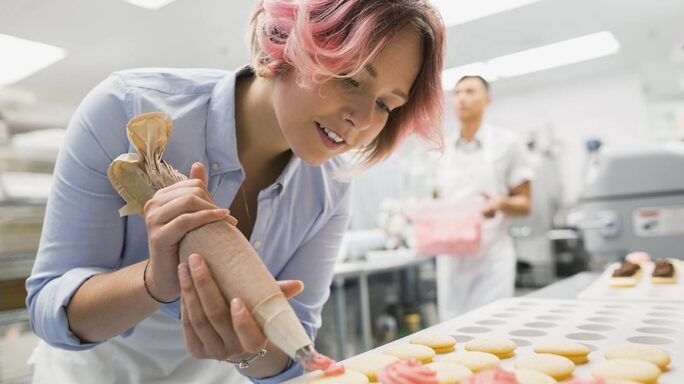Growth & Customers
Starting a business: Who is setting up in the UK and how can you do it?

Interested in starting a business? Here are some facts to consider. In 2016, more than 650,000 new businesses were started up in the UK, according to the Centre for Entrepreneurs (CFE)’s analysis of Companies House data. This figure beats the previous record set in 2015 of 608,110 new ventures.
Just over 30% of these start-ups (205,325) were registered in London but cities north of the capital showed impressive growth, with Birmingham boasting more than 17,000 new enterprises followed by Manchester (9,416), Glasgow (7,845) and Leeds (7,645).
Who is behind these new businesses?
According to data from the Business and IP Centre (BIPC) at the British Library, 34% of the entrepreneurs who have approached them as a resource are aged between 16 and 24 – the so-called youngpreneur.
There is also the unemployed or student entrepreneur – 21% of individuals helped by the BIPC are students or unemployed; 2,975 students have become entrepreneurs since 2006, while 3,439 unemployed have done the same since then.
Over-50s
Another demographic starting their own businesses, are the over-50s. Recent research from Hitachi Capital UK and the Centre for Economic and Business Research (CEBR) says this age group is creating more jobs and contributing to the growth of the UK’s economy at a faster rate than any other age group.
The older generation had spent more than the under-50s for the first time in the year ending April 2016, with a total £376bn of discretionary spending.
Analysis of the economic impact of this “silver pound” showed it translated to a boost to UK GDP of £119 billion (more than 6% of total UK GDP in 2016), supporting an estimated 1.9 million jobs.
While spending by the under-50s has grown by just 1.4% per year since 2003, spending by the over-50s over the same period has grown more than three times as fast at 4.6% per year.

Starting a business and over 50? You won’t be alone
Driven by increasing life expectancy, the number of over-50s living in the UK has increased substantially over the past 15 years to 23.6 million in 2015, a figure that is set to keep rising. The report showed that the economic contribution of this group is expected to grow by 57% over the next ten years.
The over-50s are funding their start-ups through different ways from using existing savings to withdrawing cash from their pension pot. The later method should be encouraged according to the Institute of Directors (IoD).
In September 2017, the IoD said older entrepreneurs should be allowed to withdraw a further 10% of their pension pot to fund starting up a new business, within the same tax year. This would be in addition to the existing 25% tax-free allowance.
Women
The UK has also seen a surge in women setting up businesses compared with men over the past decade, according to research from Aston University using data from the Global Entrepreneurship Monitor (GEM).
The GEM data shows that between 2003-06 and 2013-16, the proportion of women that went into business rose by 45%, compared with just 27% among men. Overall, however, men are still nearly twice as likely to be entrepreneurs (10.4% of men versus 5.5% of women).
Women in the south east of England are the most likely to take the plunge, with 7% describing themselves as early-stage entrepreneurs.
By contrast, just 2.8% of women in the north east, fall into this category. Most regions saw sizeable jumps in the proportion of female entrepreneurs over the past decade but in the south west and north east, the proportion fell.
Mark Hart, Professor of Small Business and Entrepreneurship at Aston Business School, says: “At the national level, it’s encouraging that more women are seeing entrepreneurship as a career option and a route to financial independence and that may be a reflection of a more supportive ecosystem and private sector led initiatives to highlight the success of female role models in business.”
What types of businesses are being set up?
Entrepreneurs are setting up businesses in every sector from the creative industries to a consulting businesses.
Since 2006, the BIPC has helped 500,000 aspiring business owners, including Anthony Lau, the founder of Cyclehoop, Shaun Pulfrey, a Dragons’ Den reject and founder of Tangle Teezer, and Helen Pattinson, co-founder of Montezuma’s.

Jennifer Earle found feedback invaluable when she started her business
Chocolate Ecstasy Tours
Jennifer Earle founded her business Chocolate Ecstasy Tours in 2005, combining her love for chocolate, London and meeting new people. She used BIPC’s Innovating for Growth programme to progress her business through more tours, workshops and events.
She says: “The honest feedback from experienced people was invaluable. It forced us to really look at what was working, what wasn’t and what was important.
“We got clearer on what we wanted the business to stand for, how we could communicate that and what changes we needed to make. The technical advice for ensuring we have a watertight business was also brilliant and so useful.”
AirTeem
AirTeem was formed by Ryan Godwin and Matthew Kendall to rebrand and promote the body dryer concept developed by Ryan’s dad, Michael Godwin, in 1991 in Greater Manchester. Matthew visited the Central Library to attend the monthly Inventors Group and to investigate protecting the company’s intellectual property (IP).
Thanks to information received via the group and at IP & Patent clinics in the Business & IP Centre, AirTeem was able to successfully register several product designs.
As well as IP, the library helped the company save time and money by using its 3D printing service, the videoconferencing facility and its digital business information and workshops.
International trade
Despite Brexit, small and medium-sized enterprises (SMEs) don’t appear to be put off trading overseas. Some research commissioned by international payments company OFX, revealed some entrepreneurial SMEs are shifting their focus to global sales.
Overseas, the weak pound is making British goods and services more affordable for international buyers – and UK SMEs have been quick to take advantage of the situation.
Jake Trask, FX research director at OFX, says: “Following the EU referendum, small businesses have shown their resilience by turning a weak pound into a real opportunity.
“While not all SMEs supported Brexit, their size, optimism and entrepreneurialism have allowed them to adapt swiftly to a changing market. We expect to see more of this fighting spirit as Britain prepares its exit from the EU.
“Since the Brexit vote, exporters trading with the US have seen the weak pound as a boost for business. Sterling-denominated goods have been on average 15% cheaper since the vote to leave the EU and subsequent GBP/USD exchange rate collapse.
“However, with President Trump struggling to push through his promised reforms, the dollar has weakened, eroding some of the savings seen by US importers.”
This ties in with findings from the BIPC, which has found that 53% of its users export goods and services to Europe and around the world (24% to continental Europe, 18% to US/Canada, 11% to Australasia).
Meanwhile, 62% are planning to trade with US/Canada; 59% with continental Europe, 39% with Australasia and 37% with China.

Starting a business? Lauren Aston says it’s important to be unique and not copy other businesses
Five steps to starting a business
If that’s inspired you to take the plunge and start your own business, here are five things to consider.
Have a clear and unique proposal
There is no point in starting a business that is similar to someone else’s business. Always think – what is your unique selling point? Your USP will make you stand out. Lauren Aston is the owner of a super-chunky knitwear business, Lauren Aston Designs, and in a blog post she talks about the importance of being unique and not copying other businesses.
Plan your route to market
Don’t just hurl your company on the unsuspecting business world. Plan, plan, plan. Conduct market research. Test your product or service on family, friends or the public. Know where and how to target your business as this will save you time and money.
Know your cashflow
There is nothing worse in life than spending too much money, particularly if you’re just starting your business. There is no point in spending your hard-earned cash on a flashy premises or staff if your business hasn’t got off the ground yet. Know your financial limitations. Cash is king.
Know your competition
Make sure you carry out your research either online or face-to-face – or both. This goes back to the first point: have a USP. Your competition will struggle to touch you if you do. Be able to offer a product or service that no one else is offering. This will help target a gap in the market and potentially save you from a runaway marketing budget.
Make sure your business is legally compliant
Most start-ups are either as a sole trader or a limited company. The main distinction between the two is that as a sole trader you operate the business as an individual, while a limited company is treated as a separate legal entity. Make sure you explore both options so that you know exactly what is right for you and your business.
If you’ve started a business, what advice would you offer to a wannabe entrepreneur? Let us (and them) know in the comments below.
How to start a business – your free guide
Starting a business? Our essential guide is packed with straightforward advice on everything from planning to launch.







Ask the author a question or share your advice